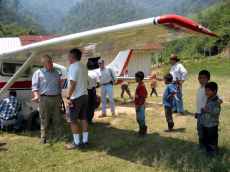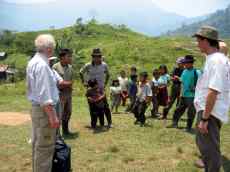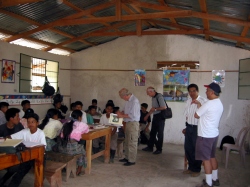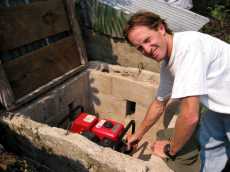|
After the landing and after a flight
of 120 Miles from Guatemala-City
to "31 de Mayo".
|
Living in the rainforest of Guatemala
In April 2003, president of the Juergen Wahn Foundation, Klaus Schubert, and board member Klaus Dehnert,
visited "31 de Mayo" in Guatemala. The village was created May 31st 1988 when the Guatemalan government settled 250
families there. These indigenous
families were displaced by the civil war, and were moved to this area deep within the Guatemalan rainforest. The Village is about
120 Miles from Guatemala City. The JWF members were able to access the village by light aircraft.
The purpose of the visit was
to ascertain the most efficient use of JWF resources earmarked for "31 de Mayo".
|
|
We are
welcomed
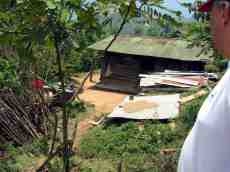
A family dwelling
The Government donated the foundation and roof materials, everything else was provided by the villagers.
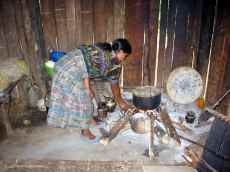
The "kitchen"
Visiting a school-class.
|
The situation of the Indigena-Village
"31 de Mayo" is governed by a municipal council, but, like most municipal councils, it needs outside
help.
Location and Access:
The settlement lies in a cleared area along a river. The village is hours away from
any other town, and most inhabitants must travel on foot. In the rainy season, passage it is often
impossible, and essential supplies must be brought in by light aircraft.
Accommodations:
There are three school buildings and one house for the
volunteers. These have been constructed of brick and stone. The local families live in wooden structures.
Nutrition:
The people of "31 de Mayo” practice the “slash and burn” method of
agriculture. Their crops consist mainly of the corn staple, bananas, and assorted vegetables. Few have livestock, and they are
unfamiliar with using cows or goats for milk. JWF is attempting to bring more sustainable agricultural methods to the
area.
Education:
The JWF in partnership with Helain Walton of South Africa is financing an elementary
school that is currently under construction. It will provide education for first and second graders. Since most of the inhabitants are
illiterate, in 2004 the JWF initiated an adult education program. Currently, women mostly attend the classes.
Health Services:
Since 2003, doctor Vivian Morales, has been providing health services at "31 de Mayo". She handles patient
examinations, childbirth, and lectures on hygiene. The JWF has undertaken to finance her
work, including medical equipment and supplies.
Water supply:
In 1988 the European Union donated water
supply equipment that is still running productively.
Electricity:
Currently, two Generators, in conjunction with a solar cell
system provide all the available electrical energy. The JWF donated several more Solar installations that will be used to light the
schools.
Communication:
Although a satellite phone exists, it will only be used for emergencies due to high
costs. In 2004 JWF financed the installation of an internet access point to allow E-Mail
communication.
|
|
Greg Walton at the generator
In addition to a few solar cells, two generators provide the
only electricity.
|
Needs and Perspectives
The people of "31 de Mayo",
especially the children need your help: Please support them and make a donation.
Donation Keyword: 31 de Mayo
Work in this "island in the rainforest" also offers opportunities for sociologists, political scientists, agricultural
engineers, and others. All can help in its development.
We are always interested in partnering with other development programs and institutions. If any individual or institution is interested
in this project please contact us. Any assistance is appreciated!
|
